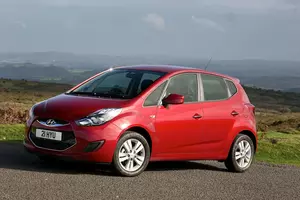
| Vehicle | Curb weight | Difference from world's smallest | Weight to power ratio | 0—60 mph acceleration ratio | Consumption ratio |
|---|---|---|---|---|---|
| 1.6d |
1281 kg / 2825 lbs |
856 kg (1888 lbs) heavier | 10 kg to 1 hp | 122 kg/s (269 lbs/s) | - |
| 1.4i |
1178 kg / 2597 lbs |
753 kg (1660 lbs) heavier | 13 kg to 1 hp | 97 kg/s (214 lbs/s) | - |
| 1.6i |
1222 kg / 2695 lbs |
797 kg (1758 lbs) heavier | 10 kg to 1 hp | 112 kg/s (247 lbs/s) | - |
| 1.4d |
1270 kg / 2800 lbs |
845 kg (1863 lbs) heavier | 14 kg to 1 hp | 94 kg/s (207 lbs/s) | - |
| Vehicle | 1.6d |
|---|---|
| Curb weight |
1281 kg / 2825 lbs |
| Difference from world's smallest | 856 kg (856 lbs) heavier |
| Weight to power ratio | 10 kg to 1 hp |
| 0—60 mph acceleration ratio | 122 kg/s (269 lbs/s) |
| Consumption ratio | - |
| Vehicle | 1.4i |
| Curb weight |
1178 kg / 2597 lbs |
| Difference from world's smallest | 753 kg (753 lbs) heavier |
| Weight to power ratio | 13 kg to 1 hp |
| 0—60 mph acceleration ratio | 97 kg/s (214 lbs/s) |
| Consumption ratio | - |
| Vehicle | 1.6i |
| Curb weight |
1222 kg / 2695 lbs |
| Difference from world's smallest | 797 kg (797 lbs) heavier |
| Weight to power ratio | 10 kg to 1 hp |
| 0—60 mph acceleration ratio | 112 kg/s (247 lbs/s) |
| Consumption ratio | - |
| Vehicle | 1.4d |
| Curb weight |
1270 kg / 2800 lbs |
| Difference from world's smallest | 845 kg (845 lbs) heavier |
| Weight to power ratio | 14 kg to 1 hp |
| 0—60 mph acceleration ratio | 94 kg/s (207 lbs/s) |
| Consumption ratio | - |

| Vehicle | Curb weight | Difference from world's smallest | Weight to power ratio | 0—60 mph acceleration ratio | Consumption ratio |
|---|---|---|---|---|---|
| 1.4i |
1268 kg / 2796 lbs |
843 kg (1859 lbs) heavier | 14 kg to 1 hp | 103 kg/s (227 lbs/s) |
211 kg/L (465 lbs/L) |
| 1.6i |
1294 kg / 2853 lbs |
869 kg (1916 lbs) heavier | 10 kg to 1 hp | 112 kg/s (247 lbs/s) |
199 kg/L (439 lbs/L) |
| 1.4 CRDi |
1370 kg / 3021 lbs |
945 kg (2084 lbs) heavier | 15 kg to 1 hp | 99 kg/s (218 lbs/s) |
304 kg/L (670 lbs/L) |
| 1.6 CRDi |
1380 kg / 3043 lbs |
955 kg (2106 lbs) heavier | 12 kg to 1 hp | 127 kg/s (280 lbs/s) |
314 kg/L (692 lbs/L) |
| Vehicle | 1.4i |
|---|---|
| Curb weight |
1268 kg / 2796 lbs |
| Difference from world's smallest | 843 kg (843 lbs) heavier |
| Weight to power ratio | 14 kg to 1 hp |
| 0—60 mph acceleration ratio | 103 kg/s (227 lbs/s) |
| Consumption ratio |
211 kg/L (465 lbs/L) |
| Vehicle | 1.6i |
| Curb weight |
1294 kg / 2853 lbs |
| Difference from world's smallest | 869 kg (869 lbs) heavier |
| Weight to power ratio | 10 kg to 1 hp |
| 0—60 mph acceleration ratio | 112 kg/s (247 lbs/s) |
| Consumption ratio |
199 kg/L (439 lbs/L) |
| Vehicle | 1.4 CRDi |
| Curb weight |
1370 kg / 3021 lbs |
| Difference from world's smallest | 945 kg (945 lbs) heavier |
| Weight to power ratio | 15 kg to 1 hp |
| 0—60 mph acceleration ratio | 99 kg/s (218 lbs/s) |
| Consumption ratio |
304 kg/L (670 lbs/L) |
| Vehicle | 1.6 CRDi |
| Curb weight |
1380 kg / 3043 lbs |
| Difference from world's smallest | 955 kg (955 lbs) heavier |
| Weight to power ratio | 12 kg to 1 hp |
| 0—60 mph acceleration ratio | 127 kg/s (280 lbs/s) |
| Consumption ratio |
314 kg/L (692 lbs/L) |